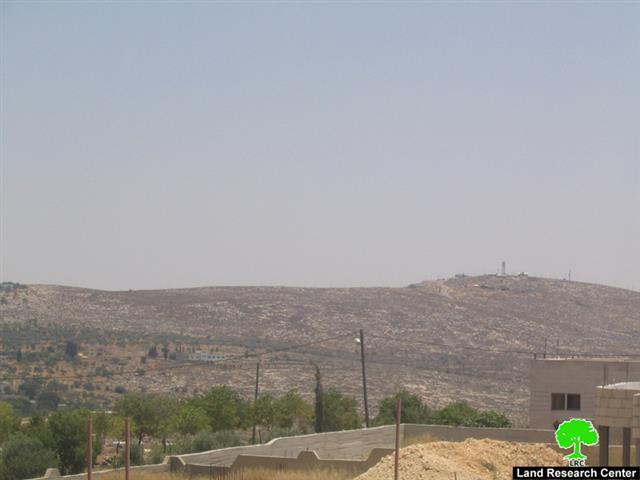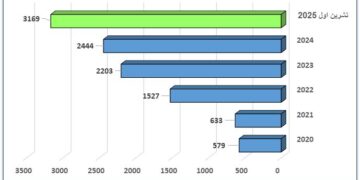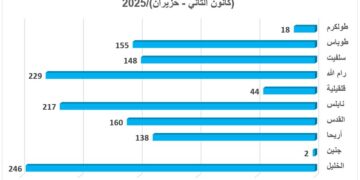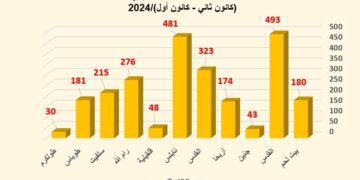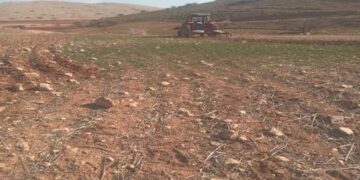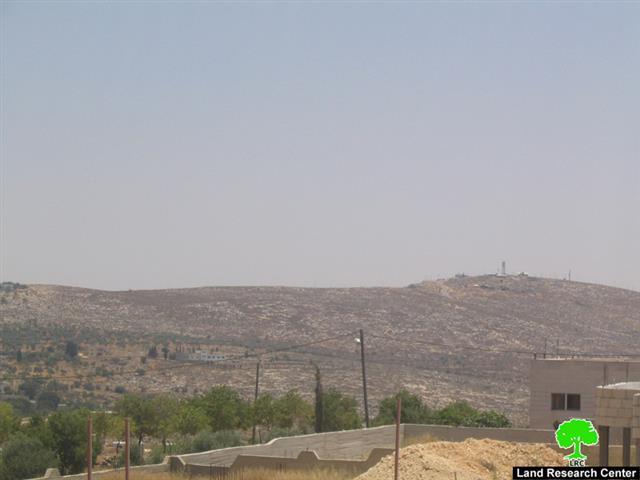On June 15, 2007, colonists of Ami Ad colonial post affiliated to Shilo and Ele colonies uprooted and stole 380 fruitful olive trees at the age of 50 years. 300 of the stolen trees are owned by farmer Ahmad Shehada Muqbil, 74 years old, and the remaining 80 are owned by farmer Ahmad Abdul hadi Jaludi and Omer Ahmad Al Bum who are all from Qaryut village in Nablus district.
( Photo 1: in the background is Ami Ad colonial post, in the foreground
are the houses of Qaryut village)
Immediately after the violation, the affected farmers levied a complaint to the District Coordination Office ( DCO) in Nablus city. After 4 hours a delegation from the DCO accompanied by Israeli police arrived at the scene and asked Mr. Ahamd Muqbil to show his proofs of land ownership. After showing them the Jordanian land taboo they took him to the Israeli police station at Bin Yamin colony near the village of Michkmas east of Ramallah for interrogation. He stayed there until midnight.
( Photo 2:a copy of the complaint presented to the Israeli police )
( Photo 3:a land registration certificate in the name of Mr. Ahmad Muqbil )
Four days later, the Israeli DCO contacted Mr. Muqbil and told him that they had found 140 trees out of the 380 inside an Israeli colony in the area without naming it. He was offered compensation for the lost trees, but he strongly refused and insisted that all his trees should be brought back, replanted and perpetrators put on trial.
An introduction to Qaryut village
The village is located 27 km to the south of Nablus city surrounded by the following villages: Talfit, As Sawiya, al lubban ash Sharqiya, Jalud and Qusra.
( Map1)
The village's total surface land area is 8471 dunums of which 394 dunums are built up area. The population of the village mounts to 2800 (Source: LRC GIS unit and PCBS). About 30% of Qaryut land area has either Jordanian or Turkish taboos (source: The village local council).
( Photo 4:a general view of Qaryut village )
An introduction to the Israeli colonization in the area
Shilo colony
The first Israeli colonial activity took place here in the year 1979 when the Shilo colony began to exist over the southern land of Qaryut and Jalud villages along the artery road No. 60 which connects the northern and southern parts of the West Bank together. Today, it comprises a religious institute and a synagogue. Its municipal boundaries in 2005 were 3276 dunums including the built up zone whose total area is 482 dunums. Until the end of 2005, the number of colonists reached 1945 ( Source-Foundation for Middle East Peace- Washington).
( Photo 5:a general view of Shilo colony an the religious institute on the right )
Like other colonies in the West Bank Shilo started to horizontally expand by years at the expense of the following areas of the lands of the two above villages: Ash Shuna hill, Wadi Ali, Jabel as Sana'a, Al Mirhan and Qala'at Al Hamra. Nowadays, the colony is scattered over seven hills including the one on the top of which was built the Ele colony. Only 30 meters separates the Qaryut houses from the colony of Ele. Citizen Musleh Ahmad tried to get a new house built for his family but failed under the pretext that the building area is close to the colony's houses.
Eli colony
In 1984 the Israeli occupation authorities started to build a new colony to the west of Shillo under the name of Eli (Ali in Arabic) because it is built on the confiscated lands of Wadi Ali to the south west of Qaryut. Wadi Ali is the separation line between Nablus governorate in the north and Ramallah in the south. Road number 60 runs at the bottom of the valley passing by the colony of Eli. Eli's municipal boundaries were 2430 dunums in the year 2005 of which 776 dunums were built up area. Its population reached 2420 by the end of 2005 (Source: ibid). The colony comprises a religious institute, hotel and a Jewish cemetery.

( Photo 6:a general view of ElI colony surrounded by olive orcahrds )
( Photo 7+8: Eli colony approaching Palestinian houses in Qaryut )
New colonial posts
After the 1996's call by Ariel Sharon on colonists to ' occupy the West Bank hill tops before losing them to Palestinians in negotiations' Israeli colonists supported by the army occupied five hill tops in the areas surrounding the Shilo and Ele colonies. Amongst these colonies are Shivot Rachel, Mitzpe Shilo and Amy Ad.
More land expropriation under security pretexts
In 2005, the Israeli occupation army issued a military decree carrying the number of T/146/05 stating the confiscation of 1200 dunums from the lands of Al Qala'a Al Hamrah ( the red castle) to the west of Qaryut village between the Shilo and Ele colonies. The real reason behind this confiscation is to create a geographical continuity between the two colonies. The target land is already inaccessible to its owners due to the colonists' revelry.
( Photo 9:part of the land confiscated under security pretexts in Al Qala'a Al Hamrah mountain )
Continuous olive tree theft
Ever since the Israeli military occupation of the West Bank in 1967 Israeli colonists and authorities have been stealing Palestinian olive trees and transferring them for re-plantation in colonies and major Israeli cities and towns inside the green line as a form of beatification. Even, rich soil has been stolen from Palestinian areas and re-allocated for exclusive Jewish use.
Repeated harassments and violations
The colonies of Shilo and Ele and their five colonial posts have become a daily nightmare for Palestinian farmers and land owners from Qaryut and Jalud villages. Ever since its establishment in 1979 the colony of Shilo has been vastly expanding over the nearby by hill tops and valleys and its colonists attacking and preventing Palestinians from accessing their lands located in the vicinity of the colonies. Farmer Ahmad Muqbil, as an example, faced the following encroachments and violations during the period from 2000 until 2005:
1. Setting fire to his 33 dunum wheat field which is situated near Ele colony in the year 2000;
2. Collecting and stealing his olive yields in the year 2000;
3. The Israeli military legal advisor decided in 2001 to allow Mr. Muqbil to access his lands and he continued to do so until the year 2003. However, from 2003 until the beginning of 2006, Mr. Muqbil was banned from entering his land by the Israeli ' civil administration's officer' who told him that ' he didn't want to feel embarrassed in front of the colonists who live in that particular area'.
4. Spraying with chemical substances or setting fire to olive trees in the year 2002;
5. During the last olive harvesting season and as a result of the intervention of the international solidarity movement (ISM) the villages' farmers and ISM members managed to collectively reach the fields, but were repulsed and beaten by angry colonists who used clubs, stones and fists against them. When the Israeli army reached the scene they dismissed all the farmers and ISM members out of the area as a solution to the problem without giving them the chance to harvest the yields. Such a solution encourages the colonists to go too far with their violations against the local indigenous people of the area.
In addition to Mr. Muqbil there are another 400 Palestinian farmers from Qaryut and Jalud villages who have been deprived from accessing their land located in the vicinity of Shilo and Ele colonies. The total area of this land is estimated at 13600 dunum divided as followed:
-
4000 dunums planted with olive trees;
-
4000 dunums used for the cultivation of ground seasonal crops;
-
5600 dunums pasture land.
Water inequity
At the water level, more than 10000 Palestinian citizens who live in the villages of Qaryut, Jalud, Talfit, As Sawiya and Alluban suffer from a severe shortage of water, especially during summer time, as a result of the Israeli total control over water resources and the in equal distribution of water shares. According to the existing statistic at LRC the Israeli colonists' share of the West Bank water is at least six times bigger than the Palestinian share. In summer, it even gets worse because of the over use of water on part of colonists for swimming and irrigation purposes inside the colonies.
Important notice:
LRC field worker was unable to obtain any pictures of the uprooted and stolen trees because the area where the violation took place is inaccessible to Palestinians and the destination of the stolen trees is unknown.
Related cases
1. Israel's olive theft policy is continued from the early days of occupation, November, 2004.
Prepared by
The Land Research Center
LRC


